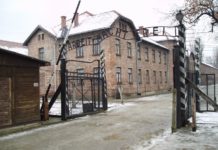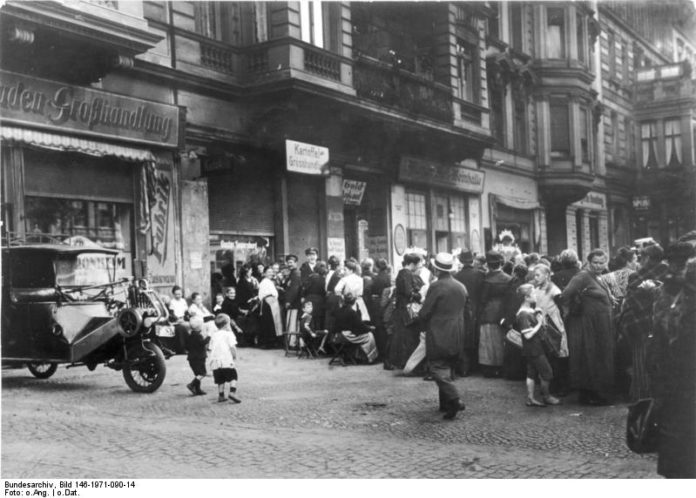
Socialistisk Biblioteks Tidslinje med links til begivenheder og personer i 1923.
Se også Index over personer, organisationer/partier og værker (som bøger, malerier, mm.), steder, begivenheder, mv., der er omtalt på hele Tidslinjen, titler og indhold på emnelisterne osv.
Bladliste 1923
Nye blade:
Bjerget. Kunstnernes Tidsskrift.
Fyraften. Fagligt tidsskrift for teori og kritik.
Kommunistisk Internationale. Tidsskrift for international faglig og politisk arbejderbevægelse. Red. Marie Nielsen.
Pressen. Periodisk Flyveskrift. Udgivet af Det nye Studentersamfund.
Motto: “Forhadt – For godt – Frygtet”
Stormklokken. Lys over Landet det er det vi vil. Udg. af Kommunistisk Ungdomsforbund i Danmark
Se på Socialistisk Bibliotek:
Arbejderhistorisk Bladliste, under året 1923.
1. januar 1923
Den senegalske forfatter og filmmand Ousmane Sembene fødes (dør 9. juni 2007).
Se:
Ousmane Sembene (Wikipedia.org)
Se på Socialistisk Bibliotek:
Linkboxen: Ousmane Sembéne og afrikansk film
31. januar 1923
Den amerikanske forfatter Norman Kingsley Mailer fødes (dør 10.11.2007).
Han skrev anti-krigs klassikeren om 2. Verdenskrig De nøgne og de døde i 1948 (danske samme år), og var aktiv imod Vietnamkrigen.
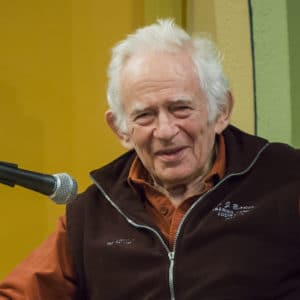
Biografier:
- Norman Mailer (Wikipedia.da). Kortere intro.
- Norman Mailer (Wikipedia.org). Længere engelsk artikel.
Nekrologer mv.:
The effort to “delete” American novelist Norman Mailer. By David Walsh (World Socialist Web Site, 17 January 2022). “American novelist Norman Mailer (1923-2007) has now fallen afoul of the campaign of McCarthy-style censorship in the book trade that previously overtook Woody Allen and Blake Bailey, biographer of novelist Philip Roth.”
The postwar novelist in regression: Norman Mailer (1923-2007). By Andras Gyorgy (World Socialist Web Site, 3 November 2009). “As we approach the second anniversary of novelist Norman Mailer’s death, there appear more and more articles assessing his work over a lifetime. The reviewers tend inevitably to focus on his scandalous behavior and outrageous statements from 1955 onward. They mention only in passing, usually without comment, that Mailer was a socialist once, in his own words, following ‘a far-flung mutation of Trotskyism’.” See also: Considering Norman Mailer and his work: a letter by James Brookfield (ibid., 9 November 2009).
Remembering Norman Mailer. By Erik Grayson (Logos, 7:1, Winter 2008). ” Although he did not see much combat first-hand, Mailer gathered enough material to write The Naked and the Dead, the first major American literary work to emerge from the War.”
Norman Mailer will not R.I.P. By Saul Landau (CounterPunch, November 24/25, 2007). “He was homophobic and misogynistic. Indeed, Mailer never learned to portray women in a realistic dimension. He clearly didn’t understand them; not a comment on his six wives.”
Norman Mailer and the ‘good war’. By Martin Smith (Socialist Worker, US, Issue 653, November 16, 2007). Martin Smith pays tribute to the great antiwar novel The Naked and the Dead, by Norman Mailer, who died last weekend at age 84.”
Norman Mailer and the menace of the US. By Alex Callinicos (Socialist Worker, UK, Issue 2077, 17 November 2007). “Mailer threw himself energetically into grappling with US society in all its variety and menace. In his youth, like other Jewish intellectuals of his generation, this effort was influenced by contact with the Trotskyist movement.”
4. april 1923
Den russiske socialdemokrat, mensjevik-lederen Julius Martov dør i eksil Schömberg (Baden-Wüttemberg) i Tyskland (født 24. november 1873, se denne)
5. april 1923
Den senere leder i Fjerde Internationale Ernest Mandel fødes (dør 20. juli 1995)
Se på Socialistisk Bibliotek:
Personlisten: Ernest Mandel
23. september 1923

DKP samles igen i ét parti efter splittelsen i 19 måneders i hhv. Møntergade- og Blågårdsgade-partiet, igen med Ernst Christiansen som formand.
Se:
Fraktionskampe i 1920’erne i artiklen: DKP (Leksikon.org)
Se de to partiers holdning til splittelsen i pjecerne:
Udviklingen i den revolutionære Bevægelse i Danmark: Et Kampskrift om Kendgerninger der Taler. Af Karl V. Jensen. – København : Udg. af Danmarks kommunistiske Parti “Sektion af 3die Internationale, 1922. – 40 s. (Forlaget Prometheus, 1972, 48 sider)
Danske revolutionære. Af Carl Heinrich Petersen (Borgen, 1970, side 259-265). Her refereres Karl V. Jensens pjece.
Den anden pjece er online: Kommunister kontra syndikalister. Af S. Hellberg, J. Erwig og Marie Nielsen (Danmarks Kommunistiske Parti, 1922, 16 sider)
Se på Socialistisk Bibliotek:
Emnelisten: Socialister på Assistens Kirkegård/Personer, om Ernst Christiansen og Johs. Erwig,
15. oktober 1923
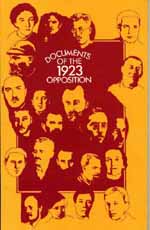
Se:
- The Declaration of 46 (Wikipedia.org).
Med dokumentet online. - Left Opposition (Wikipedia.org)
- Tema: Vänsteroppositionen (Marxistarkiv.se)
- Kommunister imod Stalin. Af Andreas Bülow (Revolution, 3. oktober 2008). Anmelderartikel af den franske marxistiske historiker Pierre Broués bog om Venstreoppositionen.
- Vänsteroppositionen i Sovjet 1923–28 (pdf). Av Christer Franzén och Per-Olof Mattsson (Fjärde Internationalen, nr.4, 1992, online på Marxistarkiv.se)
- Documents of the 1923 opposition (New Park, 1975, 80 p.; online at Marxists Internet Archive)
- Platform of the Joint Opposition (1927). By Leon Trotsky et al. (New Park, 1973, 88 p.; online at Marxists Internet Archive)
100 years since the founding of the Left Opposition: In defence of Trotskyism. By Rob Sewell (Socialist Appeal, October 16, 2023). “One hundred years ago, Leon Trotsky and his supporters founded the Left Opposition, in order to defend the revolutionary traditions of Lenin and the Bolsheviks, and the ideas of genuine Marxism. Today, we stand on the shoulders of these giants.”
The Left Opposition—Bolsheviks who defied Stalinism (Socialist Worker, Issue 2876, 9 October 2023). “100 years ago the Left Opposition began organising in Russia. Simon Basketter writes on the importance of this group who fought for international revolution and workers’ democracy.”
Losing Power: The Workers’ Opposition in the Russian Communist Party. By Daniel Gaido (Historical Materialism, 19 August 2023). Review of Barbara C. Allen (ed.), The Workers’ Opposition in the Russian Communist Party: Documents, 1919–30 (Haymarket, 2022, 944 p.). “This monumental collection gathers the main documents of the Workers’ Opposition, a tendency within the Bolshevik Party that emerged in December 1920 …”
Historical falsification and the struggle for socialism. By Andrea Peters (World Socialist Web Site, 6 January 2022). Review of Vadim Z. Rogovin, Was There an Alternative? 1923–1927. Trotskyism: A Look Back Through the Years (Mehring Books, 2021). “In this work, Soviet historian and sociologist Vadim Rogovin explodes the myth, shared by both anti-communists and Stalinists alike, that Stalinism evolved naturally and seamlessly out of Bolshevism.”
Alexander Reznik’s Trotsky and Comrades: A false account of the emergence and politics of the Left Opposition. By Clara Weiss (World Socialist Web Site, 29 October 2019). “Although it contains some useful material, the book is ultimately a distortion of the politics of the opposition and its historical emergence …”
Author’s introduction to Bolsheviks Against Stalinism 1928-1933: Leon Trotsky and the Left Opposition (Mehring Books, 2019). By Vadim Z. Rogovin (World Socialist Web Site, 30 August 2019). “[The book] focuses on five critical years during which the Stalinist bureaucracy careened from one economic and political crisis to the next.”
Historic discovery of Left Opposition manuscripts from the early 1930s. By Vladimir Volkov and Clara Weiss (World Socialist Web Site, 27 August 2018). “In February 2018, some 30 hand-written documents of imprisoned members of the Trotskyist Left Opposition from the years 1932-1933 were found in the Verkhneuralsk prison in the Southern Urals of Russia.”
The chimes at midnight: Trotskyism in the USSR 1926-1938. By Doug Enaa Greene (Links: International Journal of Socialist Renewal, October 13, 2017). “… despite the fact that they ultimately lost, through a combination of unfavorable objective circumstances, their own mistakes and poor strategy, the Trotskyist Opposition[2] managed to fight on against impossible odds for a renewal of the ideals of the Russian Revolution, internationalism and Soviet democracy.”
Trotsky, the Left Opposition and the rise of Stalinism: Theory and practice. By John Eric Marot (Historical Materialism, Vol.14, No.3, 2006, p.175-206; online at Libcom.org). “An effective factual antidote to leftist and ICC-type left-communist apologetics for Trotsky and Trotskyism’s anti-working class character in Soviet Russia.”
In honor of the Left Opposition. By Paul Le Blanc (Against the Current, Issue 67, March-April 1997). “The United Opposition advanced a program for revolutionary internationalism, more rapid industrial development, defense of workers’ rights, a return to democratic debate and decision-making within the Communist movement, and resistance to the bureaucratic degeneration of the USSR.”
The struggle of the Unified Opposition. Chapter 10 in Pierre Broué: The history of the Bolshevik Party (CP) of the USSR (1971; online at Marxists Internet Archive)
The political struggles in Russia, 1921-1929. By Pierre Broué (Marxists Internet Archive). Chapter 7-11 of The history of the Bolshevik Party (CP) of the U.S.S.R. (1971; online at Marxists Internet Archive)
Genesis of Trotskyism: The history and principles of the Left Opposition (1933). By Max Shachtman (London, New Park, 1974, 60 p.; online at Marxists Internet Archive)
On the history of the Left Opposition. By CLR James (Fourth International, Vol.II, No.1, January 1941; online at Marxists Internet Archive)
Se også på Socialistisk Bibliotek:
- Emnelisten: Den Russiske Revolution 100 år
- Emnelisten: Den russiske revolution, fra februar – oktober 1917
29. oktober 1923
Arbejderregeringen i den tyske delstat Sachsen (og 6. november i delstaten Thüringen) væltes af den tyske rigsregering.
Se:
Revolutionens højdepunkt – 1923, kap. 7 (side 41-48) + Den tyske oktober, kap. 8 (side 49-53). I Charlie Lywood: Den tabte revolution : Tyskland 1918-23. Af Charlie Lywood (Internationale Socialisters Forlag, 1997, 58 sider)
The German army toppled a pioneering radical government and opened the way for Nazism. By Karl Heinrich Pohl (Jacobin, October 23, 2023). “In 1923, with Germany gripped by hyperinflation and far-right insurgents, Social Democrats and Communists formed a joint government in Saxony. It was a pioneering experiment in working-class democracy — before the military overthrew it.”
The German Communist Party and the crisis of 1923. By Graham Milner (Links: International Journal of Socialist Renewal, 2010). “Two major consequences of the failure of the ‘German October’ were: first, it contributed towards the bureaucratic degeneration of the Soviet state; and second, it contributed towards the destruction of the KPD as a revolutionary party, thus removing it as a serious obstacle to the Nazi triumph in 1933.”
The German October. Chapter 41 in: The German Revolution, 1917-1923 (pdf). By Pierré Broué (Brill, 2005, p.791-816.; online at Libcom.org). Scroll ned.
Litteratur:
Witness to the German revolution. Writings from Germany 1923. By Victor Serge. Translated from the French by Ian Birchall ( Redwords, 2000, 236 p.).
Se på Socialistisk Bibliotek:
Linkboxen: Den tyske revolution 1918-23
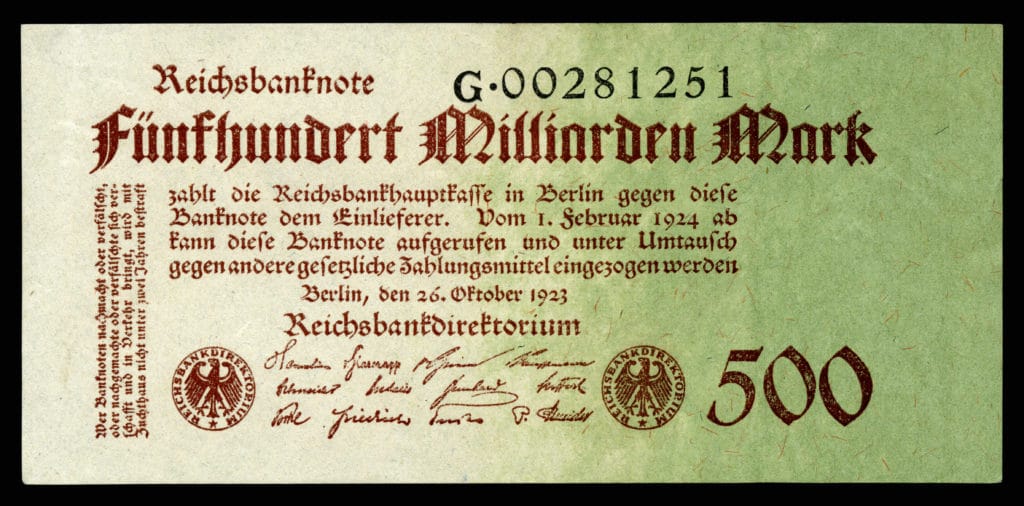
29. oktober 1923
Tyrkiet bliver republik og Kemal Atatürk bliver præsident.
Se:
Kemal Atatürk (Wikipedia.dk)
Tyrkiet (Leksikon.org)
Atatürk: Jagten på modernitet og kampen for overlevelse. Af Abdullah Simsek (Videnskab.dk, 23. januar 2014). Uddrag fra Abdullah Simsek, Atatürk og den tyrkiske revolution (Aarhus Universitetsforlag, 2013, 233 sider)
100 years of the Turkish Republic. By Pete Boggs (Solidarity, Issue 688, 1 November 2023). “On Sunday 29 October, the Republic of Turkey turned one hundred years old. This was the culmination of a process that began in the nineteenth century, and marked the victory of Turkish nationalism over not only the European imperialist powers, but also the vast array of minority peoples that had inhabited the Ottoman Empire.”
Kemal Ataturk and the birth of modern Turkey (Socialist Worker, Issue 2098, 22 April 2008). “Jamie Allison concludes our series by looking at the end of the Ottoman Empire.”
Kemalism: After the Ottomans. By Perry Anderson (London Review of Books, Vol.30, No.17, 11 September 2008, p. 3-12) + After Kemal (ibid., Vol.30, No.18 , 25 September 2008, p.13-22). Under betalingsmur.
Mustapha Kemal Atatürk and Kemalism. By Mitchell Abidor (Marxists Internet Archive). “When Mustapha Kemal led the Turkish armies to victory over the British-backed Greeks and preserved Turkey’s territorial integrity in the 1919–1923 War of Independence, he was perfectly placed as a popular hero to assume power in post-Ottoman Turkey. And once he did so he made changes as revolutionary as any in the post-World War I world.”
The origins and legacy of Kemalism. By A. Ender (Khamsin, Issue 11, 1984, p.47-69; online at Libcom.org). “Analysis on the role of Kemalism – a specific form of Turkish nationalism – in overseeing the transition from the Ottoman Empire to the Turkish Republic, demonstrating its reactionary nature in annexing Kurdistan and repressing its own working class.”
Se også på Socialistisk Bibliotek:
Tidslinjen: 28. maj 2013, om protestbevægelserne i Tyrkiet.
9. november 1923
Tysk politi stopper nazisterns kupforsøg i München – det såkaldte Ølstuekup. Hitler fængsles, og skriver i Landsbergfængslet “Mein Kampf” (se også 18. juli 1925 herom)
Se:
Ølstuekuppet (Denstoredanske)
Ølstuekuppet (Wikipedia.dk) med links til engelske artikel artikel og tyske artikel om emnet.
100 år efter ølstuekuppet: Historien om Hitlers fejlslagne kupforsøg og vej til magten. Af Karl Christian Lammers (Videnskab.dk, 8. november 2023). “For præcis 100 år siden blev en ølstue i München centrum for Adolf Hitlers forsøg på at kuppe sig til magten. Få den dramatiske historie her.”
Se også på Socialistisk Bibliotek:
Linkboxen: Nazi-Tyskland 1933-45
2. december 1923
Den syndikalistiske skribent Chris Pallis fødes i Bombay, mest kendt som Maurice Brinton (dør 10. maj 2005 i London). Politiske hovedværk er pjecen: The Bolsheviks and Workers’ Control (1970) og også Paris: May 1968 (1968). “A vivid and exciting eyewitness diary by Maurice Brinton (the writing pseudonym of Chris Pallis) of Solidarity on the events in Paris in May 1968.”
Interview with Maurice Brinton by Agora International during the Cerisy Colloquium around the work of Cornelius Castoriadis (1990). Source: Vimeo.com 15:31 min.
Se:
Chris Pallis (Wikipedia.org). Engelsk artikel med gode links. Bl.a. til nekrologer og forskellige indledninger (og debat) til hans hovedværk om den russiske revolution.
Maurice Brinton Archive (Marxists Internet Archive). Works.
Maurice Brinton (Libcom.org)
Obituary: Maurice Brinton: 1922-2005 (Red and Black Notes, Issue 21, Spring 2005; online at Libcom.org)
For Workers’ Power: the selected writings of Maurice Brinton. Review by
Richard Alexander (KateSharpley blog)
Hue and Cry. By Chris Harman (International Socialism, No.48, June-July 1971). Review of Maurice Brinton, The Bolsheviks and Workers Control (Solidarity, 1970). See debate between Brinton and Harman (International Socialism, No.52, July-September 1972)
20. december 1923
Forfatteren Ambalavaner Sivanandan fødes i Colombo, Sri Lanka. (Dør i London, 3. januar 2018, se denne)
30. december 1923
Den svenskeforfatter Sara Lidman fødes i Missenträsk i landsdelen Västerbotten. (Dør i Umeå, Vesterboten 17. juni 2004, se denne).
















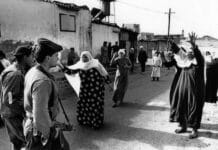
![George Habash square [Tulkarem?], Taken on 7 April 2011, Source: https://www.panoramio.com/photo/50717122. Author: Mujaddara. (CC BY-SA 3.0)](https://socbib.dk/wp-content/uploads/2007/05/George_Habash_sq_-_panoramio-218x150.jpg)
